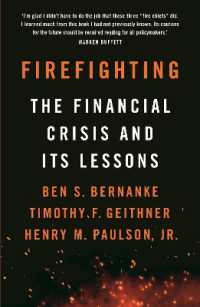Full Description
Pragmatic Markers in Irish English offers 18 studies from the perspective of variational pragmatics by established and younger scholars with an interest in the English of Ireland. Taking a broad definition of pragmatic markers (PMs) as items operating outside the structural limits of the clause that encode speakers' intentions and interpersonal meanings, this volume includes discussions of traditional PMs like sure that are strongly associated with Irish English, recent globally-spreading innovations like quotative like, and studies of tag questions, vocatives and emoticons. The data sets used cover most of the existing and developing corpora of Irish English as well as historical legal depositions, films, advertising and recent fiction, interviews, recorded conversations, and blogs. The authors address general issues such as what corpora of Irish English might add to the description of PMs in general, the interaction of Irish and Irish English, historical and contemporary uses of specific PMs, and the usage of recent immigrants to Ireland.
Contents
1. Introduction (by Amador-Moreno, Carolina P.); 2. The Pragmatics of Irish English and Irish (by Hickey, Raymond); 3. "I always think of people here, you know, saying 'like' after every sentence": The dynamics of discourse-pragmatic markers in Northern Irish English (by Corrigan, Karen P.); 4. A corpus-based investigation of pragmatic markers and sociolinguistic variation in Irish English (by Murphy, Brona); 5. Kind of and sort of: Pragmatic discourse markers in the SPICE-Ireland Corpus (by Kirk, John M.); 6. A comparative study of the pragmatic marker like in Irish English and in south-eastern varieties of British English (by Schweinberger, Martin); 7. "Actually, it's unfair to say that I was throwing stones": Comparative perspectives on uses of actually in ICE-Ireland (by Kallen, Jeffrey L.); 8. "'Tis mad, yeah": Turn openers in Irish and British English (by McCarthy, Michael); 9. Turn initiators in professional encounters: Teacher education discourse in an Irish University setting (by Farr, Fiona); 10. "And your wedding is the twenty-second of June is it?": Tag questions in Irish English (by Barron, Anne); 11. "Hurry up baby son all the boys is finished their breakfast": Examining the use of vocatives as pragmatic markers in Irish Traveller and settled family discourse (by Clancy, Brian); 12. Pragmatic markers as implicit emotive anchoring: Modality as evidence of trauma in the 1641 depositions (by Wilson, John); 13. "Sure this is a great country for drink and rowing at elections": Pragmatic markers in the Corpus of Irish English Correspondence, 1750 1940 (by Amador-Moreno, Carolina P.); 14. Blathering Beauties: The use of pragmatic markers on an Irish beauty blog (by Millar, Sharon); 15. Pragmatic markers in contemporary radio advertising in Ireland (by O'Sullivan, Joan); 16. "Yeah well, probably, you know I wasn't that big into school, you know": Pragmatic markers and the representation of Irish English in fictionalised dialogue (by Palma-Fahey, Maria); 17. "There's, like, total silence again, roysh, and no one says anything": Fictional representations of new pragmatic markers and quotatives in Irish English (by Amador-Moreno, Carolina P.); 18. Now in the speech of newcomers to Ireland (by Migge, Bettina); 19. The significance of age and place of residence in the positional distribution of discourse like in L2 speech (by Nestor, Niamh); 20. Name index; 21. Subject index







